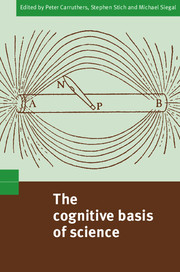Book contents
- Frontmatter
- Contents
- List of contributors
- Preface
- 1 Introduction: what makes science possible?
- Part one Science and innateness
- Part two Science and cognition
- Part three Science and motivation
- 12 The passionate scientist: emotion in scientific cognition
- 13 Emotions and epistemic evaluations
- 14 Social psychology and the theory of science
- Part four Science and the social
- References
- Author index
- Subject index
13 - Emotions and epistemic evaluations
Published online by Cambridge University Press: 23 November 2009
- Frontmatter
- Contents
- List of contributors
- Preface
- 1 Introduction: what makes science possible?
- Part one Science and innateness
- Part two Science and cognition
- Part three Science and motivation
- 12 The passionate scientist: emotion in scientific cognition
- 13 Emotions and epistemic evaluations
- 14 Social psychology and the theory of science
- Part four Science and the social
- References
- Author index
- Subject index
Summary
Emotional states make a positive contribution to the epistemic evaluations we use in carrying out everyday inquiries and scientific investigations. After sketching a role for them in regulating our beliefs through expressing unarticulated values, the chapter suggests that this illuminates the roles of doubts in spurring inquiries, and of dogmatism in science (section 3). These emotional evaluations possess a kind of immediacy although they are often grounded in a mass of unstated experience and background belief (section 4). One important role for such immediate evaluations is in telling us when to stop our investigations and remain satisfied with the evidence we possess (section 5). Section 6 considers de Sousa's (1987) suggestion that emotions can serve this role by rendering items of information salient or relevant, enabling us to treat them as reasons while ignoring much else. The final section considers some special roles that emotional evaluations might have in the conduct of co-operative scientific inquiry.
Introduction
Epistemology (the study of epistemic evaluation) generally exploits often unstated assumptions about the kinds of representations and psychological mechanisms involved in cognition: we won't understand the nature of epistemic norms unless we can say something about how they are realized – about the cognitive processes that they regulate and the ways in which they engage with them. Since science is a co-operative activity which exploits the judgements and inquiries of individual agents, it is plausible that the same holds for the philosophy of science: we need an account of the kinds of representations and psychological mechanisms that are exploited in co-operative scientific inquiry.
- Type
- Chapter
- Information
- The Cognitive Basis of Science , pp. 251 - 262Publisher: Cambridge University PressPrint publication year: 2002
- 11
- Cited by



